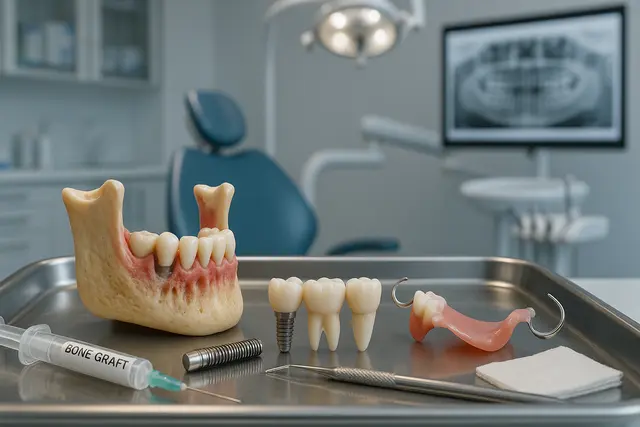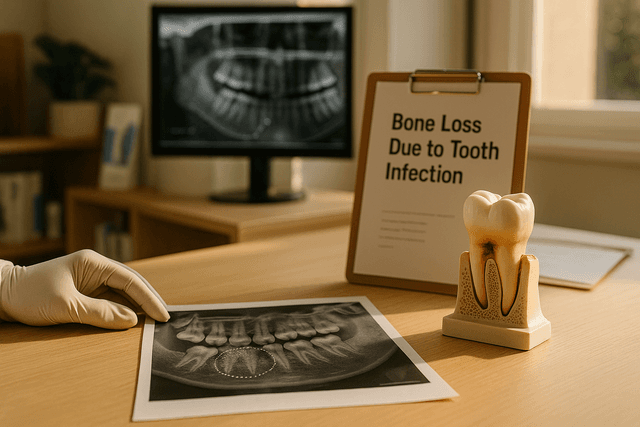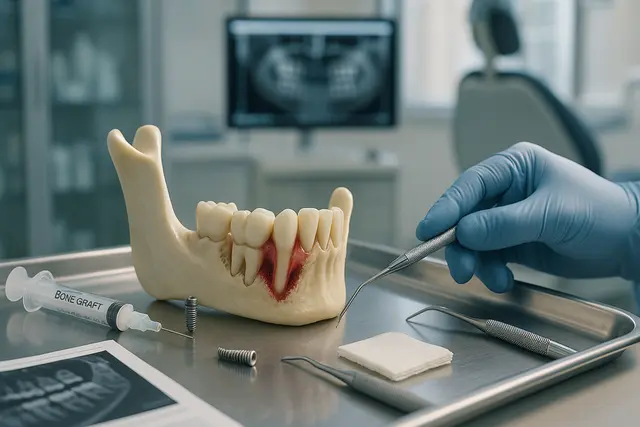Oral Health
5 min read
Jun 23, 2025
Suffering from a Toothache? Here’s How to Stop Tooth Pain Fast
Toothaches have a special talent for showing up at the worst possible moments, late at night, during a big meeting, or right in the middle of dinner. That sharp, aching, or throbbing pain can make it hard to focus on anything else. If you're scrambling for fast relief, don’t worry.

There’s nothing quite like a toothache to turn a decent day into a nightmare. One minute you’re enjoying your coffee, and the next, bam! That sharp pain shoots up your jaw like a fire alarm, and suddenly, all you can think about is how to make it stop. Tooth pain doesn’t wait for a convenient time. It strikes in the middle of the night, during meetings, or while you're just trying to get through dinner.
Whether it’s a dull throb, a sharp stab, or a persistent ache, let’s talk about how to stop tooth pain fast, with tips that actually work and don’t feel like they were copied from a dusty textbook.
Toothache Pain: What's Actually Happening?
Before we start throwing every home remedy at your sore tooth, it helps to understand what might be causing your toothache. The most common causes of tooth pain include:
Cavities (aka tooth decay chewing through your enamel)
Infected or inflamed tooth pulp
A cracked or broken tooth
Tooth sensitivity from worn enamel or receding gums
Basically, if you’re dealing with pain and inflammation in your mouth, it’s your body’s way of saying something’s wrong, and it’s not going to quit whispering until you listen.
Dental Remedy Options When You Can’t Get to the Dentist
Sure, calling your dentist should be the long-term move. But what if it’s 2 a.m.? Or you're out of town without access to professional dental care? Good news: there are several effective home remedies for toothache that can provide temporary relief until you get help.
Try This Cold Compress Trick to Numb the Pain and Reduce Inflammation
When your face feels like it’s pulsing or swelling around the affected area, grab a cold compress. Wrap a bag of frozen peas or a cold pack in a towel and hold it on your cheek for 15 to 20 minutes. This helps numb the pain and reduce inflammation, especially for tooth nerve pain relief. It’s not magic, but it works.
Hydrogen Peroxide Rinse: Not Just for Cuts
If your gums are inflamed or bleeding, a hydrogen peroxide rinse can help. Mix equal parts of 3% hydrogen peroxide and warm water. Swish it around your mouth gently and spit it out, do not swallow it. This rinse kills bacteria, helps relieve pain, and can even reduce plaque that’s irritating the tooth and gum.
Tea Bag Compress: Yes, Really
A warm, moist tea bag can do more than just comfort your soul. Place a used tea bag (black or peppermint tea works best) on the sore tooth or gum. Black tea has astringent tannins that can help with swelling, while peppermint tea is soothing and mildly numbing. It's a simple, natural remedy that can ease toothache without a trip to the pharmacy.
Understanding What Causes Tooth Pain in the First Place
Let’s talk about what actually causes tooth pain so you’re not playing whack-a-mole with symptoms. Tooth pain can be due to:
Infections in the pulp inside the tooth
Gum irritation from food debris or plaque buildup
Cracks that expose the sensitive tooth nerve
Untreated decay sneaking deep into the enamel
Knowing the root cause (pun fully intended) helps you choose the right remedy for toothache and sets the stage for better long-term care.
Home Remedies for Toothache That Actually Help
When you’re desperate for relief, you’ll try just about anything. Here are some time-tested, natural remedies that can help relieve toothaches while you wait to see a dental professional.
Clove oil: Dab a little on a cotton ball and apply it to the affected tooth. Clove oil contains eugenol, a natural anesthetic that can help relieve tooth pain quickly.
Saltwater rinse: Mix salt and warm water and swish for 30 seconds. It helps with inflammation and fights off bacteria. It’s boring but effective.
Crush a garlic clove: Garlic isn’t just for vampires. Crush a garlic clove, mix with a bit of salt, and apply it to the painful tooth. It can help relieve pain and kill bacteria.
These aren’t just old wives’ tales, they’re backed by solid science and centuries of experience.
The Power of Peppermint Tea for Mouth Pain
If your mouth pain feels more like an annoying dull ache than a stabbing emergency, peppermint tea can bring sweet relief. The menthol in peppermint helps numb the area and reduce discomfort. Let the tea bag cool a bit before applying it directly to the sore tooth or drink it for a soothing effect. Bonus: your breath will smell better, too.
When You Need Tooth Pain Relief From Medications
Sometimes, natural remedies just aren’t cutting it. That’s where over-the-counter pain medications come in. Ibuprofen and acetaminophen are both effective at taking the edge off, especially if you’re dealing with pain and inflammation. Just be sure to follow the dosage instructions and don’t mix pain relievers unless your dentist or doctor gives the green light.
What to Do if Your Toothache Won’t Go Away
If the pain persists longer than two days or keeps you up at night, it’s time to stop playing the home remedy game. A serious dental issue like an infection, abscess, or deep cavity needs professional dental care. Ignoring it can lead to a bigger problem, like losing the tooth or needing more invasive dental procedures later.
Signs you need an emergency dental visit:
Swelling in your face or gums
Fever or chills
Sharp pain that won’t quit
A bad taste in your mouth (could be pus)
A broken tooth with exposed pulp
Preventing Tooth Pain Starts with Solid Dental Habits
Most of us wait for the pain before we act. But preventing tooth pain is a whole lot easier, and cheaper, than fixing it later. Good dental care at home includes:
Brushing twice a day with fluoride toothpaste
Flossing daily (no skipping)
Using a soft toothbrush to avoid irritating your gums
Regular dental checkups (we know, nobody loves them, but still…)
Keeping your oral health in check helps you avoid future problems like decay, tooth sensitivity, or gum disease.
Final Thoughts: You Deserve Relief, Not Regret
Tooth pain can make even the toughest among us feel helpless. But you’re not stuck. There are smart ways to get temporary relief, from a cold compress on your cheek to clove oil on a cotton ball. Home remedies for toothache can offer a break from the throbbing pain, but they’re not a substitute for seeing a dental professional. If you want to truly stop the pain and prevent it from coming back, the right remedy is a combination of immediate relief and long-term dental health care.
What Can I Do to Relieve Tooth Pain Quickly at Home?
For fast, temporary relief, try a cold compress on your cheek, rinse with saltwater or diluted hydrogen peroxide, and apply clove oil to the affected tooth. Over-the-counter pain relievers like ibuprofen can also help reduce pain and inflammation until you can see a dentist.
Why Does Tooth Pain Happen in the First Place?
Tooth pain usually stems from issues like cavities, infected pulp, gum disease, or cracked teeth. These problems expose sensitive nerves or cause inflammation, which leads to the sharp or throbbing pain you feel. Understanding the cause helps guide the best treatment.
When Should I Stop Using Home Remedies and Call a Dentist?
If your toothache lasts more than two days, gets worse, or comes with swelling, fever, or a foul taste, it’s time to see a dentist. These symptoms can indicate a serious infection or abscess that needs professional treatment to avoid permanent damage.
Can Natural Remedies Like Garlic or Tea Bags Really Help?
Yes, natural remedies can offer short-term relief. Crushed garlic has antibacterial properties, clove oil numbs pain, and a cooled tea bag, especially peppermint or black, can reduce swelling. They won't cure the cause, but they can ease symptoms while you wait for dental care.
Read Next
Related Posts

Oral Health
Tooth Replacement Options to Prevent Bone Loss
Losing a tooth isn’t just about appearance, it can have a lasting impact on your oral health, jawbone strength, and overall quality of life. When teeth go missing, the jawbone begins to shrink, which can change your bite, your facial structure, and even your confidence. Fortunately, modern dentistry offers several effective solutions to replace missing teeth and prevent further bone loss.
4 min read
Sep 26, 2025

Oral Health
Bone Loss Due to Tooth Infection Explained: What It Means for Your Oral Health
A tooth infection isn’t just about pain, it can quietly damage the tissues around a tooth and even erode the jawbone that supports your smile. This guide explains how infections start, why they can lead to bone loss, the warning signs to watch for, and the treatments that can stop the spread and rebuild lost support.
5 min read
Sep 25, 2025

Oral Health
Understanding Bone Loss in Teeth: Causes and Treatments That Work
Bone loss in teeth is a silent threat that can compromise your smile, facial structure, and overall oral health. While it often goes unnoticed in the early stages, it can lead to serious consequences if left untreated. Understanding what causes dental bone loss, and how to prevent or manage it, is key to maintaining a strong, healthy foundation for your teeth.
5 min read
Sep 25, 2025
Don’t have time to research every dentist around you?
See why 30k+ patients trusted us